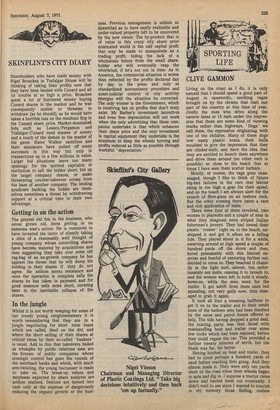SKINFLINT'S CITY DIARY
Shareholders who have made money with Nigel Broackes in Trafalgar House will be thinking of taking their profits now that they have been landed with Cunard and all its trouble at so high a price. Broackes spent a lot of borrowed money buying Cunard shares in the market and he was consequently unable to threaten to withdraw (as he should), as he would have taken a horrible loss on the resultant flop in the Cunard share price. Market-dominated bids such as Leasco/Pergamon and Trafalgar/Cunard need masses of money and a touch of the demon in the master of the game. Slater Walker satellites and their emulators have pulled off many successes in this way but only in transactions up to a few millions in value. Larger bid situations leave too many openings for the spirited capitalist or institution to sell the bidder short, bid up the target company shares, or make threatening counter-takeover noises from the base of another company. The lending syndicate backing the bidder are themselves sometimes a threat by withdrawing support at a critical time to their own advantage.
Getting in on the action
The greyest old fox in the business, who never grows old, loves getting in on someone else's action. He is rumoured to have invented the tactic of silently taking a slice of a reasonably well thought of young company whose controlling shares have become watered by acquisitions and then suggesting they take over some old rag-bag of an .ex-growth company he has against the threat that he will dump his holding in their shares if they do not agree. He seldom meets resistance and once the operation is complete sells the shares he has taken in payment and for good measure sells more short, covering later in the inevitable collapse of the shares.
In the jungle
Whilst it is not worth weeping for some of our trendy young conglomerateers it is worth remembering that they are in a jungle negotiating for short term loans which are called, dead on the dot, and where the short selling of their shares at critical times by their so-called ' bankers ' is usual. Add to this that takeovers hailed as triumphs by public relations men are the flotsam of public companies whose strategic control has gone the rounds of the merchant banks and which, with much arm-twisting, the young buccaneer is made to take on. The break-up values and surpluses expected by share analysts are seldom realised. Debtors are turned into cash only at the expense of dangerously reducing the organic growth of the busi ness. Previous management is seldom so dimwitted as to have easily realisable and under-valued property left to be uncovered by the new owner. The by-product that is of value in this crazy city share price dominated world is the odd capital profit that may be made to masquerade as a trading profit, hiding the lack of a wholesome future from the small shareholder who will eventually reap the whirlwind, if he's not out in time. As in America, the commercial situation is worse than reflected by the profits declared day by day in the press and only as standardized accountancy procedure and quasi-judicial control of city activity emerges will the situation be corrected. The only winner is the Government, which is receiving tax on profits that don't truly exist. Mr Barber's investment incentives and even free depreciation will not work when the only advertising that these companies undertake is that which enhances their share price and the only investment in capital equipment they undertake is the minimum to keep the wheels turning and profits reduced as little as possible through wasteful depreciation.'


































 Previous page
Previous page